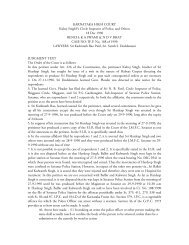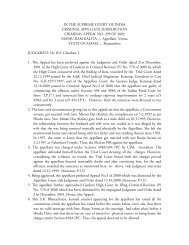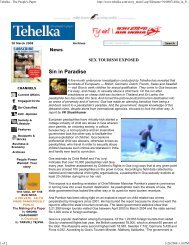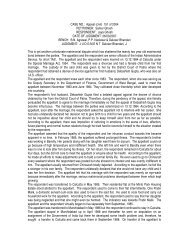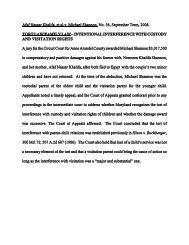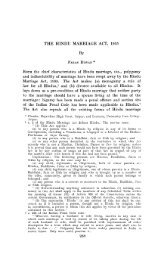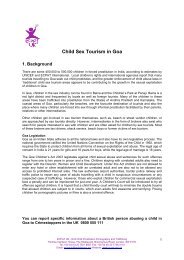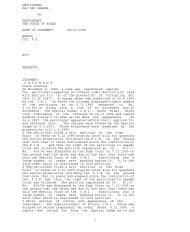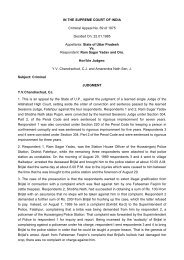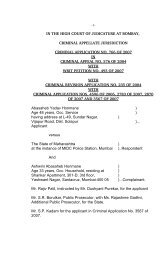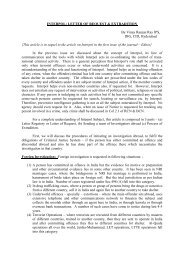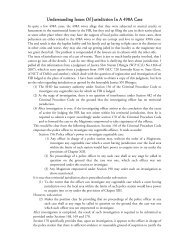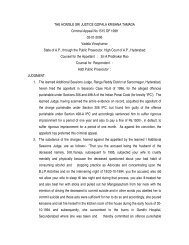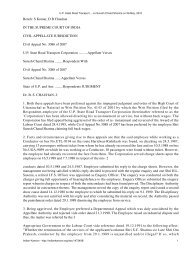J Dhingra-Explains-Defamation-2009 - IPC 498A
J Dhingra-Explains-Defamation-2009 - IPC 498A
J Dhingra-Explains-Defamation-2009 - IPC 498A
You also want an ePaper? Increase the reach of your titles
YUMPU automatically turns print PDFs into web optimized ePapers that Google loves.
IN THE HIGH COURT OF DELHI AT NEW DELHIDate of Reserve: January 22, <strong>2009</strong>Date of Order: March 02, <strong>2009</strong>IA No.10367/2007 in CS(OS) 569/2006 02.03.<strong>2009</strong>Prof. Imtiaz Ahmad ...PlaintiffThrough: Mr. Abhay N. Da, AdvocateVersusDurdana Zamir ...DefendantThrough: Mr. Bahar U. Burai with Mr. Hanif Mohammad, AdvocatesJUSTICE SHIV NARAYAN DHINGRA1. Whether reporters of local papers may be allowed to see the judgment? Yes.2. To be referred to the reporter or not? Yes.3. Whether judgment should be reported in Digest? Yes.ORDERIA No.10367/20071. This suit has been filed by the plaintiff for damages on account of defamation and forpermanent injunction on the ground that defendant filed a complaint before the CrimeAgainst Women (CAW) Cell allegedly making defamatory allegations against him. Theplaintiff claimed damages to the tune of Rs.20 lac from the defendant.2. The excerpts of the complaint, which, according to the plaintiff amounted to hisdefamation and entitled him to damages, are as follows:"(i) On the issue of dowry, my husband's mother Jamila Begum, Nand (husband'ssister Rakahanda), Second Nand (Rafia), my husband's Khala Hasina and secondKhala Sabina and Khaloo Imtiaz Ahmad raised considerable noise (Hangama) andthey were calm down by efforts of my relatives.(ii) In my in-laws' house, my husband's Khala (Aunt) and Khaloo(uncle), who livesin JNU, Prof. Imtiaz Ahmad and his wife Sabina has considerable influence (dakhal).(iii) You are requested to help me to see that there is no interference in my familyaffairs of my husband’s aunt and uncle who live in JNU".3. It is contended by the plaintiff that plaintiff was a highly reputed person. He was aprofessor of Sociology at JNU. He was internationally known and was visiting professor innumber of universities in USA, Canada, Italy and UK. He was a man of internationalacademic standards and had taken part in number of national and international conferencesand was a familiar voice on AIR, BBC, NDTV, ETV etc. He stated that he had no contactwith the defendants family or with the family of her husband except that he had attended themarriage. At one point of time, the relations between defendant and her husband becameestranged and she had come to his house accompanied by her father, mother and brother andasked him to interfere in the matter. However, since he was not willing to take any interestor intervene in the matter, he refused. He stated that on the basis of the complaint made bythe defendant, an FIR No.611 under Sections 406,<strong>498A</strong> and 34 Indian Penal Code wasregistered by the police and he had to obtain anticipatory bail.
4. It is submitted by plaintiff that in the complaint made by defendant, he has beenportrayed as a perpetrator of dowry demand and in his name Ansari CS (OS)569.06 Prof.Imtiaz Ahmad vs. Durdana Zamir has been deliberately added since Ansaris belong to lowercommunity viz Julaha. He claimed that he was renowned social psychologist and because ofthe assertions made by the defendant in her complaint to CAW Cell and other authorities,his reputation received severe dent in academic circles and among his colleagues and alsotowards the mammoth work that he has done for the betterment of the society in general.5. Defendant has made the instant application under Order 7 Rule 11 of CPC statingtherein that the plaint does not disclose any cause of action and was liable to be dismissed.The claim of the plaintiff was based upon the facts stated in a complaint made by thedefendant to lawful authorities regarding her grievance against her in-laws. The FIR lodgedby her was under investigation and it has not been held by any Court that the allegationsmade by the complainant (defendant herein) were false.6. During arguments, it was also submitted that even if the allegations are taken per secorrect, no case for defamation of the plaintiff was made out from the averments made in thecomplaint. Learned counsel for the plaintiff, however, denied that the plaint does notdisclose any cause of action and submitted that the allegations made in the complaint by thedefendant has lowered the image of the plaintiff in the eyes of society.7. Under law of defamation, the test of defamatory nature of a statement is its tendency toincite an adverse opinion or feeling of other persons towards the Plaintiff. A statement is tobe judged by the standard of the ordinary, right-thinking members of the society at therelevant time. The words must have resulted in the Plaintiff to be shunned or evaded or CS(OS) 569.06 Prof. Imtiaz Ahmad vs. Durdana Zamir regarded with the feeling of hatred,contempt, ridicule, fear, dislike or dis- esteem or to convey an imputation to him ordisparaging him or his office, profession, calling, trade or business. The defamation is awrong done by a person to another's reputation. Since, it is considered that a man'sreputation, in a way, is his property and reputation may be considered to be more valuablethan any other form of property. Reputation of a man primarily and basically is the opinionof friends, relatives, acquaintance or general public about a man. It is his esteem in the eyesof others. The reputation spread by communication of thought and information from one toanother. Where a person alleges that his reputation has been damaged, it only means he hasbeen lowered in the eyes of right thinking persons of the society or his friends/relatives. It isnot enough for a person to sue for words, which merely injure his feeling or cause annoyanceto him. Injury to feeling of a man cannot be made a basis for claiming of damages on theground of defamation. Thus, the words must be such, which prejudice a man’s reputationand are so offensive so as to lower a man's dignity in the eyes of others. Insult in itself is not acause of action for damages on the ground of defamation.
8. Where the words are used without giving impression of an oblique meaning but thePlaintiff pleads an innuendo, asking the Court to read the words in a manner in which thePlaintiff himself understands it, the Plaintiff has top lead that the libel was understood by thereaders with the knowledge of subject or extensive facts as was being understood by thePlaintiff.9. The plaintiffs submissions that adding of caste "Ansari" against his name was per saydefamatory is very strange. The plaintiff claims to be the professor of sociology working forthe betterment of the society. If a professor CS (OS)569.06 Prof. Imtiaz Ahmad vs. DurdanaZamir of sociology has a notion and thought that "Ansari" was a caste of lower class since itrepresents "Julaha” community, I can only take pity upon such highly respected andqualified professors. Julaha means weavers. If those who weave clothes so that men may dressthemselves, are of lower caste than those who get dressed and are ungrateful must be of muchlower caste, even if they are professors. The allegations of the plaintiff, who is a professor, arepainful. The Constitution of India does not recognize that caste of any person confers anysuperiority or inferiority on him vis-a-vis others. The Constitution only recognizes deprivedclasses under which Scheduled Castes or Scheduled Tribes fall and mandates positive actiononly to bring them at par with the other members of the society so that they are notdiscriminated by so-called high castes people. If a professor of sociology in our country hasthis standard of social betterment, then God help this society.10. The other imputations made to the defendant are also not defamatory in nature. It is notthe case of the plaintiff that he was not present at the marriage. It is the case of the plaintiffhimself that he attended the marriage of the defendant. If it is stated that a Hungama wascreated by many from in-laws of the defendant, including the plaintiff, that does not meanthat the defendant made defamatory imputations against the plaintiff or the defendant madea statement to cause an adverse opinion or hatred feelings of other persons towards theplaintiff. As has already been observed above the statements to be judged by the standard ofan ordinary person. The alleged words must have resulted in the plaintiff to be shunned orevaded or inculcated a feeling of hatred and condemn. The plaintiff continues to be theprofessor in JNU and he continues to a known voice at different TV Channels. It is not thecase that people have abandoned him or boycotted him because CS (OS) 569.06 Prof.ImtiazAhmad vs. Durdana Zamir of this imputation. The plaintiff has not named a single personwho had changed his opinion after filing of the complaint by the defendant.11. Moreover, the defendant had a right to make complaints of her grievances to theauthorities. Whenever a person makes a complaint against someone to the lawful authoritiesand in that complaint he makes imputations against the person complained of, it cannot beconsidered that the person has publicized or publicly made defamatory averments against aperson. If a prosecution is initiated against the person on the basis of such averments and theperson is acquitted holding that the complaint was false, then only a cause of action arisesagainst the complainant for launching a case for false prosecution or for damages on othergrounds. Until and unless a competent court holds that complaint was false, no cause ofaction arises. Approaching a competent authority and praying that the authority shouldcome to the rescue of the complainant and prevent inference of the plaintiff in the family
affairs of the defendant cannot amount to a defamatory imputation per se and even if it ispublished, it does not tend to show that the defendant had intended to lower the reputationof the plaintiff.12. In view of the foregoing facts and circumstances, I consider that the plaint, even if takento be true, does not disclose any cause of action against the plaintiff. The suit of the plaintiffis liable to be dismissed and is hereby dismissed.March 02, <strong>2009</strong>SHIV NARAYAN DHINGRA J. rdCS (OS) 569.06 Prof. Imtiaz Ahmad vs. Durdana Zamir



